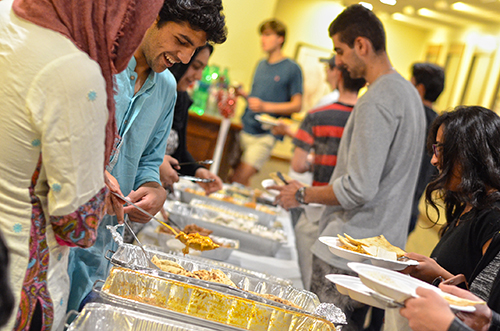 Members of the Muslim Student Association gather in the Green and Gold room at Bartow Arena to serve a meal to Fastathon attendees after a day-long fast. Photo by Ian KeelTamara Imam - Managing Editor
Members of the Muslim Student Association gather in the Green and Gold room at Bartow Arena to serve a meal to Fastathon attendees after a day-long fast. Photo by Ian KeelTamara Imam - Managing Editormanaging@insideuab.com
Muslim and non-Muslim students alike joined together in the Green and Gold Room of Bartow Arena to break a daylong fast on Thursday, Oct. 27.
The Muslim Student Association hosted the 14th annual Fastathon, an event held on university campuses across North America to raise awareness about hunger and thirst and to educate people on Islam and the people who practice it.
MSA teamed up with United Muslim Relief Birmingham to put on this year’s event. Each year, MSA raises funds for a specific project related to global hunger, and this year the two organizations worked together, the first time there has been a partnership, to raise funds to build a well in Sudan. Water in the area is often low-quality and contaminated with E. coli, Vibrio Cholerae, Salmonella typhi and Hepatitis A, according to the International Association for Medical
Assistance to Travelers.
In the weeks leading up to the event, the group sold T-shirts, held bake sales and tattooed henna to raise money and garner support. On the day of Fastathon, students pledged to fast from dawn to dusk, in the same manner that Muslims do during the holy month of Ramadan.
“It was a little challenging, especially the last two or three hours. It’s like everything I want to do involves eating,” second year Fastathon participant and sophomore Alex Young said. “It feels unhealthy, it makes me think ‘this isn’t good for me,’ yet you know there’s a significant portion of people on the planet who are going through that too, so it really makes you empathize a little bit.”
According to Ala’a Abuspetani, a junior and the secretary for MSA, Fastathon is also an opportunity to break down barriers between Muslim and non-Muslim students on campus.
“I hope they got to see the way Muslims really are, that some stereotypes were broken for them, that they learn not to take everything or anything at face value,” Abuspetani said. “I also hope those who fasted gained better insight into how people around the world feel daily when they don’t have the same basic resources that we have. I hope they were able to effectively put themselves in other people’s shoes and see the other side of the world.”
Catherine Davis, a white Muslim originally from the U.K., was initially hesitant to attend the event after she felt slighted by members of the MSA when inquiring about details at one of the group’s bake sales.
“Everyone has bad days, that is completely understandable, but the treatment that a friend of mine and myself received did not seem appropriate and not what I was expecting when getting more information on the Fastathon,” Davis said. “Representation of any organization, not just the MSA, should be considered rather seriously in my opinion. Though this may have been an isolated incident, when one feels as though they have perturbed a member of any society with questions [over events] gives an overwhelmingly unwelcome feeling and acts as a deterrent for a person to get involved in activities on campus.”
Despite the negative first impression, Davis attended the event anyways after speaking to members of the MSA board, and left with a different perspective.
“My view has shifted from neutral to an overall positive stance. The members were very welcoming to not only me but to even those who were non-Muslim that came to the event as well,” Davis said. “Overall the MSA is a very welcoming and friendly group which went against many of the notions I previously held.”
Davis acquiesces that social boundaries exist within the Muslim community, but that they are not form of separation, but rather of distinction.
“As various different groups not isolated by sexual orientation, ethnicity or religious decree come together, our communities can grow and come to better understandings of each other and why we do [and] believe the things that we do,” Davis said.
As of Sunday, Oct. 30, MSA has raised $4269 toward their $10,000 goal to build the well in Sudan. The group is still accepting donations at launchgood.com/sudan.


